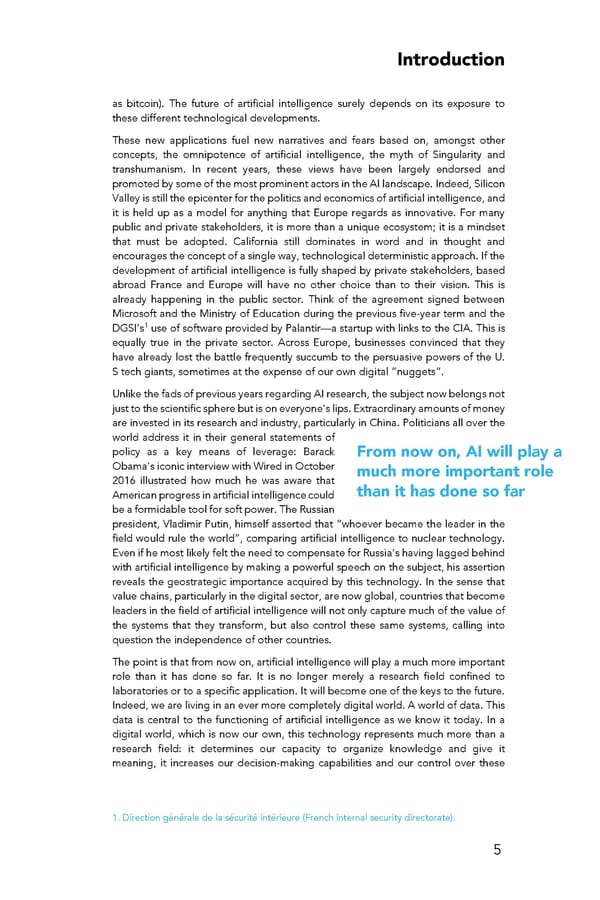Introduction as bitcoin). The future of artificial intelligence surely depends on its exposure to these different technological developments. These new applications fuel new narratives and fears based on, amongst other concepts, the omnipotence of artificial intelligence, the myth of Singularity and transhumanism. In recent years, these views have been largely endorsed and promoted by some of the most prominent actors in the AI landscape. Indeed, Silicon Valley is still the epicenter for the politics and economics of artificial intelligence, and it is held up as a model for anything that Europe regards as innovative. For many public and private stakeholders, it is more than a unique ecosystem; it is a mindset that must be adopted. California still dominates in word and in thought and encourages the concept of a single way, technological deterministic approach. If the development of artificial intelligence is fully shaped by private stakeholders, based abroad France and Europe will have no other choice than to their vision. This is already happening in the public sector. Think of the agreement signed between Microsoft and the Ministry of Education during the previous five-year term and the DGSI’s1 use of software provided by Palantir—a startup with links to the CIA. This is equally true in the private sector. Across Europe, businesses convinced that they have already lost the battle frequently succumb to the persuasive powers of the U. S tech giants, sometimes at the expense of our own digital “nuggets”. Unlike the fads of previous years regarding AI research, the subject now belongs not just to the scientific sphere but is on everyone’s lips. Extraordinary amounts of money are invested in its research and industry, particularly in China. Politicians all over the world address it in their general statements of policy as a key means of leverage: Barack From now on, AI will play a Obama’s iconic interview with Wired in October much more important role 2016 illustrated how much he was aware that than it has done so far American progress in artificial intelligence could be a formidable tool for soft power. The Russian president, Vladimir Putin, himself asserted that “whoever became the leader in the field would rule the world”, comparing artificial intelligence to nuclear technology. Even if he most likely felt the need to compensate for Russia’s having lagged behind with artificial intelligence by making a powerful speech on the subject, his assertion reveals the geostrategic importance acquired by this technology. In the sense that value chains, particularly in the digital sector, are now global, countries that become leaders in the field of artificial intelligence will not only capture much of the value of the systems that they transform, but also control these same systems, calling into question the independence of other countries. The point is that from now on, artificial intelligence will play a much more important role than it has done so far. It is no longer merely a research field confined to laboratories or to a specific application. It will become one of the keys to the future. Indeed, we are living in an ever more completely digital world. A world of data. This data is central to the functioning of artificial intelligence as we know it today. In a digital world, which is now our own, this technology represents much more than a research field: it determines our capacity to organize knowledge and give it meaning, it increases our decision-making capabilities and our control over these 1. Direction générale de la sécurité intérieure (French internal security directorate). 5
 For a Meaningful AI - Report Page 5 Page 7
For a Meaningful AI - Report Page 5 Page 7